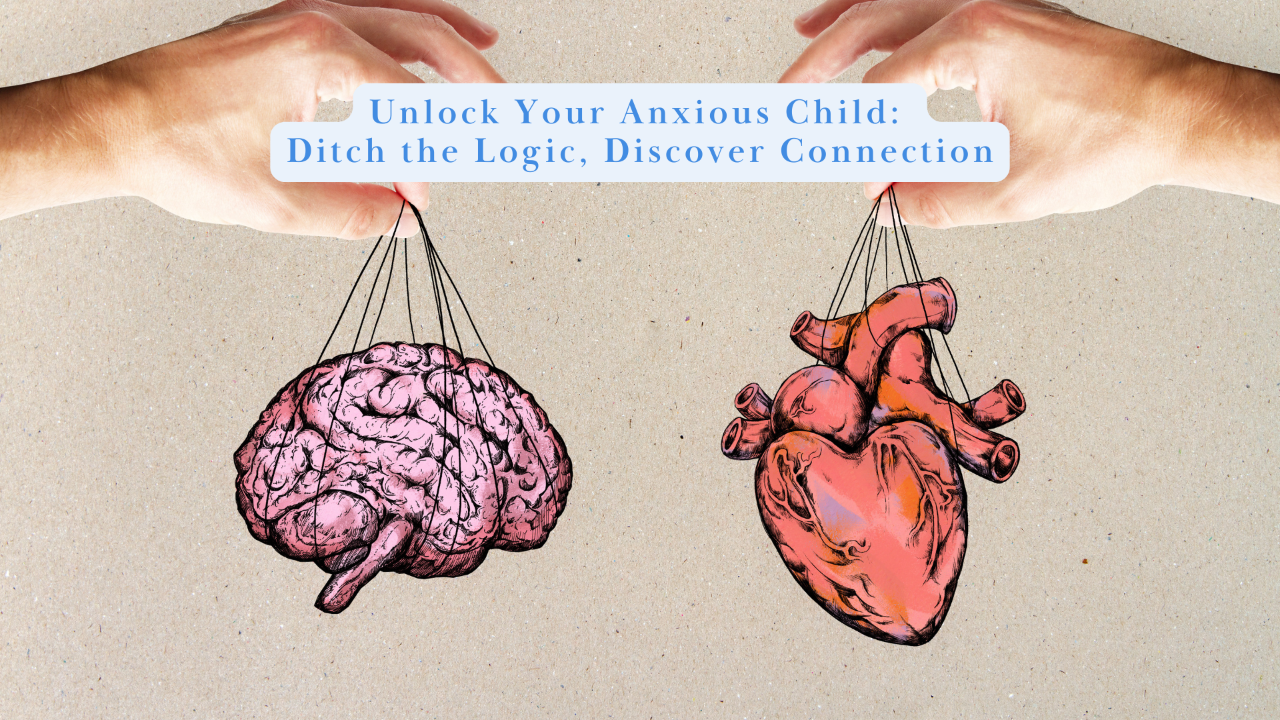Anxiety, Parenting, and What Actually Helps
Real world reflections from the clinic, the home, and everywhere in between
The Logic Trap: Why Your Anxious Child Isn't Hearing You (and What Actually Helps)

"I've gone over this countless times. Why the disconnect?"
That feeling of hitting a wall when your anxious child seems impervious to reason – especially when distress peaks – is a shared experience. It’s a frequent topic in my work with families. But the issue isn't a refusal to understand; it's that logic simply isn't the right tool for their brain in that moment.
Let's examine the underlying mechanism.
▍Stress Overrides Rational Thought
When a child is anxious – whether withdrawing or experiencing an emotional surge – their capacity for higher-level thinking (governed by the prefrontal cortex) temporarily diminishes. The emotional center of the brain (amygdala) takes precedence. This isn't a willful act; it's a fundamental neurological shift.
Attempting to explain "it's not a big deal" or "you already know this isn't frightening" at this point is akin to offering complex instructions to someone in immediate danger. It's not what they require.
▍First Priority: Establishing Secu...
How to Inoculate Kids Against Sociopathy — With Empathy

Let me start with an uncomfortable truth. Children don’t become adults with sociopathy overnight. It is not something that simply “happens.” It is shaped gradually—often quietly—through repeated emotional disconnection, unmet relational needs, and a lack of consistent adult guidance.
To be clear:
We do not diagnose sociopathy in children.
The clinical term, Antisocial Personality Disorder, is reserved for adults. However, in my work as a youth forensic psychiatrist, I do encounter early behavioural patterns that raise concern—such as cruelty to others, chronic lying, or apparent indifference to consequence. But these signs don’t automatically mean a child is on the path to becoming sociopathic.
And this is an important distinction.
▍Every Child Experiments with Self-Centredness
We all carry some degree of self-interest and emotional short-sightedness. In childhood, that’s not sociopathy—it’s developmentally normal.
Children are still learning what empathy feels like, what it req...
The One Thing Doctors Won't Tell You About Managing Anxiety in Children!

As a parent, you've probably heard the usual advice for helping anxious kids—therapy, medication, lifestyle changes.
But there's a powerful technique that often gets overlooked: empathic connection.
Why Connecting Emotionally Works Wonders
Building a genuine emotional bond with your anxious child can be transformative. Here’s why it’s so effective:
1. Trust Creation: Empathic connection builds trust, encouraging kids to open up about their fears. According to Dr. Brene Brown, "Trust is built in very small moments."
2. Reducing Isolation: Empathy helps children feel less alone in their struggles. Knowing someone genuinely understands their feelings can be incredibly comforting and alleviating. As Dr. Daniel Siegel puts it, “Empathy is the antidote to shame.”
3. Emotional Regulation: By validating their emotions, you teach your child how to manage their feelings more effectively. This validation helps them understand and control their anxiety. Dr. John Gottman explains, “E...
The Noodle Analogy: A Fresh Way to Support and Connect with Your Anxious Child

As parents, we often seek the best ways to support our children, especially when they feel anxious or overwhelmed. Traditional methods like the “compliment sandwich”—where criticism is sandwiched between two compliments—can sometimes feel forced and ineffective. Okay, hear me out: let’s think “noodles, not sandwiches.” This simple yet powerful analogy can transform how we encourage and bolster our children’s self-esteem and connect with them on a deeper level.
The Noodle Analogy
Imagine your child as a raw noodle—firm and crunchy, full of potential but needing the right conditions to thrive. With time, warmth, and the right ingredients, that noodle can transform into something amazing. Here’s how each core element of the noodle analogy can help you support and connect with your anxious child:
Water (Warmth)
- Concept: Warmth represents the comforting and soothing presence you provide.
- Application: When your child is anxious, start by creating a calm and safe environment. ...
A Wake-Up Call: Prevention of Mental Health Problems Starts at Home 🏠
A recent article in The Lancet highlights the alarming prevalence of multimorbidity among individuals with severe mental illness, underscoring the need for comprehensive care. These are things we already knew but have now been tactfully validated by the good authors of this paper.
But to me… here’s the crux:
Prevention MUST start at home. 🏠
When children are well-connected with their families, they are less likely to fall into the traps of phone addiction, substance abuse, and youth crime.
Some Key Takeaways from The Lancet Article🗝️
- Prevalence of Multimorbidity: People with severe mental illness, such as schizophrenia-spectrum disorder and bipolar disorder, face higher rates of both physical and psychiatric multimorbidity compared to those without severe mental illness. [Go figure!]
- Impact on Health Outcomes: The presence of multiple chronic conditions significantly worsens health outcomes for individuals with severe mental illness.
- Younger Populations at Higher Risk: Younger ...
Positive Parenting Leads to Less Aggressive Children

Well, parents, it looks like science has confirmed what many of us suspected: being kind and understanding towards our children can actually lead to less aggressive behaviour. Who knew parenting could be so straightforward?
A recent study has shed light on the impact of different parenting styles on preschoolers' behaviour. Turns out, the "authoritarian" approach - you know, the one where parents channel their inner drill sergeant - might not be the best way to go. Surprisingly (or not), this style is linked to higher levels of aggressive behaviour in young children.
But don't worry, there's good news too! The study highlights the benefits of "authoritative" parenting - a balanced approach that combines high expectations with emotional support. It's like being a firm but friendly teacher who also offers a listening ear. This style seems to lead to more positive behavioural outcomes.
Here's something interesting: the research suggests that fostering empathy in children can act
...School Bullying, Parental Anger, and the Power of Empathy

The issue of school bullying is one that can stir a tempest of emotions in the hearts of parents. Witnessing or learning about someone causing harm to your child can evoke a primal anger, a fierce protective instinct. However, in the midst of these stormy feelings, it's crucial to anchor ourselves with empathy and understanding, both for our children's sake and our own. Here's how we can navigate these turbulent waters, turning our anger into action and empathy into empowerment
Understanding Parental Anger
First, it's important to acknowledge that anger, in the face of your child's suffering, is a natural response. It signifies your deep love and concern. However, the way we handle this anger can make a significant difference in the outcome for our children. Anger, when channeled constructively, can motivate us to take positive steps. Left unchecked, it can cloud our judgment and hinder our ability to provide the support our children need.
Channeling Anger into Advocacy
1. Educate ...
Navigating the Digital Age with Empathy: A Guide for Parents
Empathy is vital because it fosters trust, which is the foundation of human connection. While much has been said about the cognitive and affective components of empathy, it's important to note the richness of the perceptual aspects of empathy.
To cultivate this often neglected but powerful aspect of empathic connection, we must first understand how to empathize with our children. By doing so, we can create a deeper understanding of their perspectives and feelings. As parents, we can then use this knowledge to provide better guidance and support.
Let me show you how you can start to cultivate this crucial aspect of empathic connection with your children.
Teaching Empathy to Children: A brief Guide

Teaching Empathy to Children: A brief Guide
Empathy plays a vital role in creating genuine human connections. Not only does it help us become more impactful in the world, but it also facilitates trust, which is critical for winning hearts and minds.
Empathy is a multidimensional concept with numerous attributes that contribute to its effectiveness. While we are still learning about how to express empathy, we are also discovering how to systematize and foster skills that can improve our empathetic capacity.
A child's empathic skill development is influenced by a wide range of experiences, including the way caregivers relate, communicate, and convey their mental models of the world to them. Cultural and social media influences also play a significant role in shaping young minds.
As a parent or teacher, you have a crucial role to play in the development of empathy in children. Raising a child in the digital age is not for the complacent. While you cannot predict what w...
Understanding Accurate Empathy: The Three Components

At its core, empathy requires an understanding of three essential components. These components are: cognition (thoughts), affect (emotion), and perception (feelings).
Perception, for instance, is the ability to sense things through our senses. Although intangible, it is real. The wind, for example, can be felt but not seen. Similarly, when we feel an unexplainable connection to someone, it's like the invisible pull of a magnetic force.
However, empathy is not just about perception. Overemphasizing this component can lead to inaccurate empathizing due to neglecting the other components. Therefore, all three components need to be considered for optimal balance and impactful empathizing.
By training yourself to be sensitive to the relative "weight" of each component in any given moment, your empathic skills will improve significantly. This understanding can help to decrease the likelihood of invalidating someone and i...

